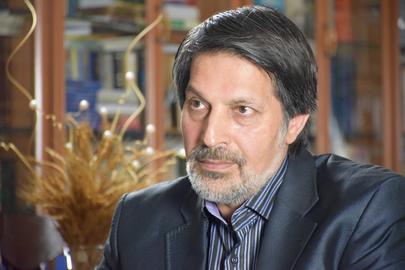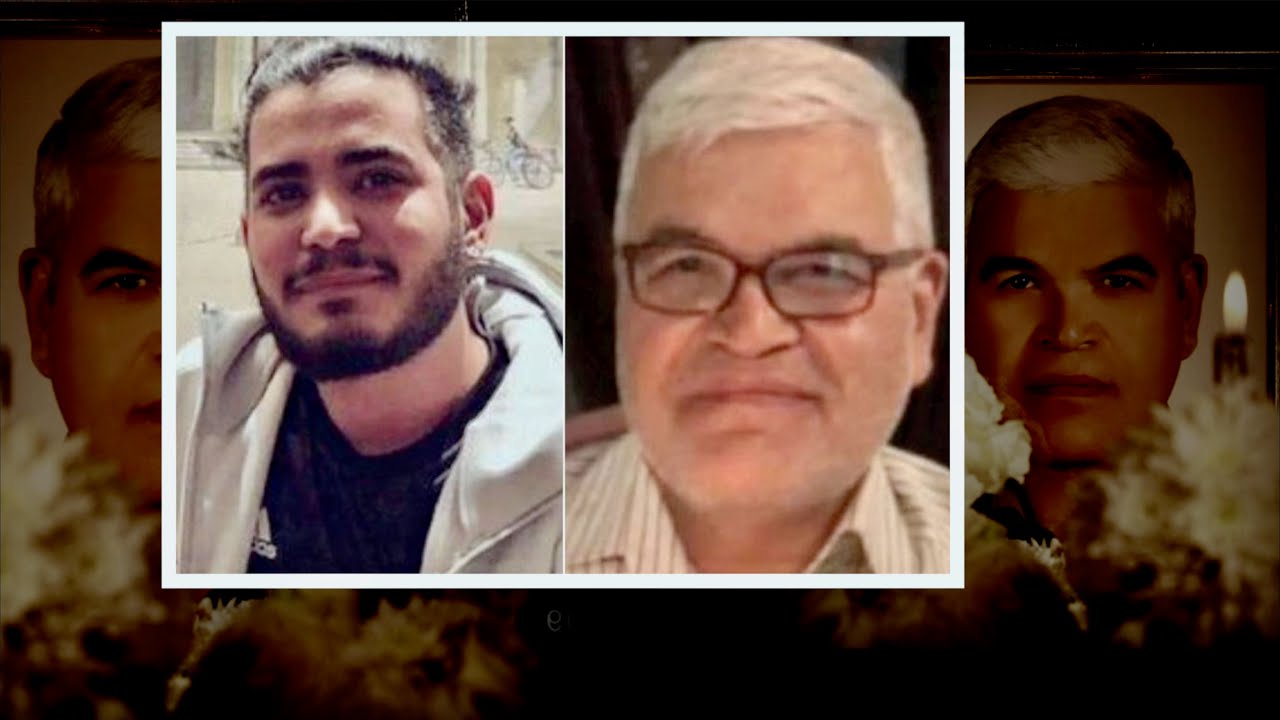On October 13, human rights activists shared a video about the father of a jailed protester who killed himself after weeks of anguish and worry over his son Amirhossein Moradi, who has been sentenced to death. The family was said to have faced intense pressure from authorities not to talk about the case.
The video included footage of the online funeral for Mohammad Nasser Moradi, who hanged himself in the basement of his house on September 28. His wife and daughters talked to IranWire about his suicide and the days leading up to it. IranWire also spoke with human rights activist and anti-death penalty campaigner Emadeddin Baghi about what families like the Moradis go through, and how the Iranian judicial system, the security apparatus and Iran's leaders have created an environment where hope is scarce and anger continues to mount.
***
On September 27, the day before Mohammad Nasser Moradi killed himself, he arrived at the family home with shopping. He had more than usual, his daughter said, and among the items he brought was a rope, which he threw into a corner. Later that night, when everyone in the house was asleep, he took the rope and placed it around his neck.
The next morning, Moradi’s wife and daughter wondered where he was. They found him in the basement, hanging from the ceiling.
Perhaps, say his wife and daughters, as a father, Moradi thought he could somehow save his son, who had been sentenced to death after attending a protest. Somehow, they say, he might have thought he could give his life so his son, who he had carried on his shoulder as a child and who had always followed him everywhere he went, would be spared.
”My child was never interested in politics, but he was fearful about the future," Mohammad Nasser Moradi's widow Fereshteh Homayounfar told IranWire through tears. She described what it was like when her son Amirhossein was arrested, and then held in a cell and later sentenced to death. "I talked and mourned and Amirhossein's father tried to calm me. He said our son would be saved. But I think he was also broken. Maybe he wanted to save his son's life by doing this. Because he carried out exactly the same sentence on himself that was given to Amirhossein."
Amirhossein Moradi, Saeed Tamjidi and Mohammad Rajabi were arrested following widespread protests in November 2019. They have been accused of acting against the regime through sabotage and have all been sentenced to death. After the sentences were announced in June 2020, an international campaign using the hashtag Do_Not_Execute, was launched, sparking calls from around the world for Iranian authorities to show clemency and reverse the sentences. The verdicts were initially issued in February 2020, and after the news broke about the sentences in June, a judiciary spokesman confirmed the sentences on July 14, and media again reported that the sentences had been upheld on July 23.
Amirhossein Moradi was born on August 6, 1994. He holds a degree in computer science and worked for the computer and software industry and in mobile phone retail before his arrest in Tehran. After Moradi was arrested and they knew they could also face arrest, Saeed Tamjidi and Mohammad Rajabi fled to Turkey, but the Turkish Immigration Service illegally deported them back to Iran — under both international and Turkish law, it is unlawful to send someone back to a country where they face the death penalty. The announcement that their death sentences had been upheld was reported soon after.
The Political Assassinations of Mostafa Salehi and Navid Afkari
At first, Iranian authorities appeared to have responded to pressure from activists in Iran and around the world. Soon after the remarkable support demonstrated by the Do_Not_Execute campaign, lawyers for the three political prisoners announced that their executions had been suspended. But this was followed by the sudden executions of two other protesters, Mostafa Salehi, who took part in protests in December 2017 and January 2018, and Navid Afkari, who protested in summer 2018. They were executed on August 5 and September 12, 2020, respectively, sparking fears that Moradi, Rajabi, and Tamjidi might be executed in secret.
The executions of Salehi and Afkari were carried out quickly and in secret, despite what legal professionals and human rights activists have described as flaws in their cases. Those campaigning for justice in Iran have characterized the men’s deaths as political assassinations.
Opponents of the death penalty point out the inhumanity of the sentence, and say it is a form of torture for the families that lose their loved ones. The family of Amirhossein Moradi is a testament to this: the moment the sentence was handed down, the torture began.
A Society Unable to Change its Destiny
Anti-death penalty campaigner and author Emadeddin Baghi knows a lot about the psychological suffering the death penalty has caused, and has published several books on these tragedies. He also joined the online mourning ceremony for Mohammad Nasser Moradi, addressing the mourners in a brief speech.
During the online ceremony, Baghi told the mourners that he blamed the Iranian government for Moradi’s suicide. The way it has treated people over the years has produced an environment in which people have simply lost hope, he said. "If people feel they are unable to change their destiny, their failure turns into aggression. This aggression will be expressed either toward oneself or toward others. If society reaches this point, no power can control this aggression.”
Iran’s legal system and judiciary might be flawed, Baghi says, but authorities also seem unwilling to even follow the rules they have set, and it is innocent families who suffer. In the case of Navid Afkari, he says, there were calls for the prosecution to be reopened since the family of the man Afkari allegedly murdered had indicated they might be willing to discuss blood money, a kind of retribution payment that would mean his life could be spared. “But he was suddenly executed, and this is very distressing for the families,” Baghi says.
He says both the judiciary and lawmakers know the turmoil and pressure prisoners sentenced to death and their families face, although they may avoid confronting such a reality in their day-to-day conduct. "They understand, and consciously make these decisions to control society. But only if such a thing ever happened to them would they fully realize the disasters and tragedies these decisions and orders cause.”
Baghi says the lawyer representing Amirhossein Moradi had reported that a few days before Mohammad Nasser Moradi committed suicide, the family received a phone call saying their son's life was in danger and suggesting they inform the media. Later it emerged that the anonymous caller had phoned from Norway, citing a human rights organization. Baghi says the details of the call and the caller are unclear, but he says the call also had a huge impact on the family and they felt they were under further pressure to do something.
Amirhossein Moradi’s father’s suicide sparked fresh debate about the value and effectiveness of appealing to the media about stories of political prisoners. Many activists and journalists reiterated their belief that informing the media is the best way to save the accused, arguing that if people don’t speak out, the Islamic Republic will repeat what it did to prisoners in the 1980s, fuelling a horrific cycle of suffocation, repression, and violence.
"Emotion cannot pass through the filter of power-based politics,” says Emadeddin Baghi, who calls for compassion to be reinstated into all aspects of Iranian society, and especially the way it is governed. “The security policy in Iran is based on pessimism and suspicion, and the judicial system is based on a rigid legal view. The judiciary seeks to punish the offender, regardless. The accused, on the other hand, has a family that Iran’s strict laws do not take into account. We must make room for human emotions. Otherwise we will move toward violence, cruelty, disgust, and a crisis of delegitimization. For this reason, human rights must be at the heart of politics, power, security, and the judiciary. History has shown that all those involved in systems of politics, power, security, and the judiciary will later fall victim to the same policy that they have inflicted on the people."
The Islamic Republic, he says, is today devoid of compassion. Some critics argue it has been absent since the republic’s inception 41 years ago. Certainly, he says, it lacks transparency.
The death sentences against Amirhossein Moradi, Saeed Tamjidi and Mohammad Rajabi remain in place, even though they are currently suspended. There are countless people — it’s impossible to know how many — who have been sentenced to death and died in Iranian prisons, among them people charged with drug offenses, moharebeh (“waging war against God),” “corruption on earth,” or who have been killed according to the Islamic jurisprudence doctrine of qisas, or retaliative punishment for their crimes.
According to the latest statistics published by the Iran Human Rights organization on October 10, the International Day for the Abolition of the Death Penalty, at least 209 people have been executed in Iran this year, most of them cases where the punishment of qisas was handed down. For many years, Iran has topped the list of the world’s biggest executioners, second only to China.
Related coverage:
Iran Sentences Three Protesters to Death
Torture and Coercion: Fresh Information Surfaces on the Nightmarish Trial of Three Young Protesters
Iranian Asylum Seekers in Turkey are Returned to Iran and Sentenced to Death
He was Tortured. He Maintained his Innocence. He was Executed
Iran’s Judiciary is Slowly Murdering Prisoners of Conscience
visit the accountability section
In this section of Iran Wire, you can contact the officials and launch your campaign for various problems




























comments